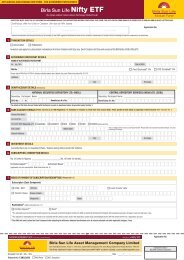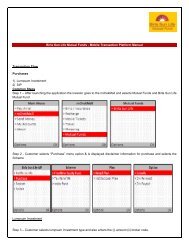Empower for the Month of February 2013 - Birla Sun Life Mutual Fund
Empower for the Month of February 2013 - Birla Sun Life Mutual Fund
Empower for the Month of February 2013 - Birla Sun Life Mutual Fund
You also want an ePaper? Increase the reach of your titles
YUMPU automatically turns print PDFs into web optimized ePapers that Google loves.
All About <strong>Mutual</strong> <strong>Fund</strong>s<br />
Rising expenses, children’s education,<br />
unexpected emergencies and finally retirement<br />
– <strong>the</strong> demands on people’s money seem to<br />
be ever-rising. And savings alone may not<br />
prove to be enough to meet <strong>the</strong>m all. Making<br />
judicious investments though can make <strong>the</strong>ir<br />
money work harder. However, most people are<br />
reluctant to invest as <strong>the</strong>y find it very puzzling.<br />
More so, <strong>the</strong>y don’t have <strong>the</strong> time to monitor<br />
<strong>the</strong> stock markets.<br />
What is <strong>the</strong> way <strong>the</strong>n to help you achieve<br />
your financial needs and goals? The<br />
answer can be mutual funds. Here are<br />
a few things about mutual funds that<br />
you must know in order to benefit from<br />
<strong>the</strong>m:<br />
What are mutual funds?<br />
A mutual fund is a pr<strong>of</strong>essionally managed collective<br />
investment scheme that pools money from many investors.<br />
This money is <strong>the</strong>n invested in stocks, bonds, short-term<br />
money market instruments, and/or o<strong>the</strong>r securities.<br />
Types <strong>of</strong> mutual funds<br />
<strong>Mutual</strong> funds can broadly be classified as open ended<br />
or close ended. While open ended funds are available <strong>for</strong><br />
subscription and repurchase on a continuous basis and<br />
do not have a fixed maturity period, close ended funds are<br />
open <strong>for</strong> subscription only during a specified period at <strong>the</strong><br />
time <strong>of</strong> launch <strong>of</strong> <strong>the</strong> scheme and have a stipulated maturity<br />
period. The funds can fur<strong>the</strong>r be classified according to <strong>the</strong><br />
investment objective as:<br />
• Growth or equity funds: The aim <strong>of</strong> growth funds is to<br />
provide capital appreciation over medium to long term.<br />
Such schemes normally invest a major part <strong>of</strong> <strong>the</strong>ir<br />
corpus in equities and have comparatively high risks.<br />
• Debt funds: The objective <strong>of</strong> debt funds is to generate<br />
steady returns while aiming to preserve your capital.<br />
They invest only in fixed income instruments like<br />
company bonds, debentures, government securities etc.<br />
• Balanced funds: These funds invest in both equity and<br />
debt in varying proportions. So, <strong>the</strong>ir average returns and<br />
risk pr<strong>of</strong>ile also fall some where in between growth and<br />
debt funds.<br />
How do mutual funds score over equities?<br />
Unlike equity Investments, mutual fund investments do not<br />
require you to analyze and track companies and <strong>the</strong> ways<br />
<strong>of</strong> <strong>the</strong> market. Also <strong>the</strong>y can help <strong>the</strong>m stay less affected by<br />
<strong>the</strong> fall in <strong>the</strong> prices <strong>of</strong> one particular stock as <strong>the</strong>ir returns<br />
are derived by overall per<strong>for</strong>mance <strong>of</strong> various stocks that <strong>the</strong><br />
<strong>Mutual</strong> <strong>Fund</strong> invests in.<br />
What’s <strong>the</strong> right time to buy and sell mutual funds?<br />
The right time to buy mutual funds is when <strong>the</strong> prices <strong>of</strong> <strong>the</strong><br />
funds are low or falling. However, <strong>the</strong> holding period should be<br />
determined by <strong>the</strong> market conditions ideally. For eg. in growth<br />
funds a greater holding period can <strong>of</strong>fer greater chance to<br />
benefit.<br />
What are SIPs?<br />
A systematic investment plan allows you to invest in a fund<br />
at regular intervals ra<strong>the</strong>r than a lump sum one time amount.<br />
SIPs are based on <strong>the</strong> principle <strong>of</strong> rupee cost averaging<br />
which can help make a fall in scheme’s NAV work to <strong>the</strong><br />
investor’s advantage. When <strong>the</strong> NAV falls because <strong>of</strong> a fall<br />
in <strong>the</strong> market, SIP can help accumulate more units at lower<br />
rates while restraining <strong>the</strong>m from going overboard in a rising<br />
market by giving fewer units at those higher levels. Fur<strong>the</strong>r,<br />
by staying invested <strong>for</strong> a long period <strong>of</strong> time, <strong>the</strong>y may also<br />
pr<strong>of</strong>it from <strong>the</strong> appreciation in equities tend to show over <strong>the</strong><br />
long term.<br />
How do I select <strong>the</strong> right mutual funds?<br />
While choosing a mutual fund, it’s important to keep your<br />
objectives, risk appetite and investment budget in mind. You<br />
should also keep in mind <strong>the</strong> per<strong>for</strong>mance <strong>of</strong> <strong>the</strong> fund over<br />
<strong>the</strong> last couple <strong>of</strong> years and check <strong>the</strong> exit load charged by a<br />
particular scheme which is charged as a percentage <strong>of</strong> NAV<br />
and has <strong>the</strong> effect <strong>of</strong> reducing returns by that amount.<br />
By keeping <strong>the</strong>se simple things in mind,<br />
you can make mutual fund investments<br />
that can work to your advantage and<br />
help in realizing your financial goals.<br />
01

















